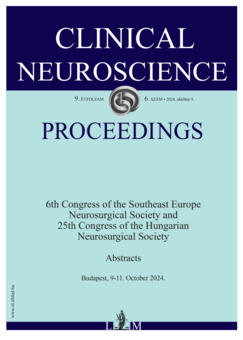New isolation protocol of human astrocytes from brain
GRADISNIK Lidija1, VELNAR Tomaz2
2024. OKTÓBER 09.
Ideggyógyászati Szemle Proceedings - 2024;9(6)
GRADISNIK Lidija1, VELNAR Tomaz2
2024. OKTÓBER 09.
Ideggyógyászati Szemle Proceedings - 2024;9(6)
Szöveg nagyítása:

Aims: In vitro organ culture systems with living nerve cells are very attractive for investigating the mechanisms of neurotrauma and neurodegeneration. Astrocytes are a particular focus of research. These cells are usually isolated from animal tissue. We have developed a relatively fast and simple protocol for the isolation of astrocytes from brain biopsies with a high yield and low risk of contamination.
Method: Human astrocytes can be obtained after cranial surgery, especially in neurotrauma patients after brain nectomy. Fragments of viable tissue removed during surgery were collected under sterile conditions. The tissue was cut, minced and seeded through a mesh system. After sequential centrifugation and separation, the sediment was harvested and the cells were seeded in suspension supplemented with special media (DMEM Advanced) with high nutrient content (FBS) and antibiotics (streptomycin, penicillin). Characterization was performed and the cells were subisolated.
Results: The isolated cells remained viable and proliferated rapidly. Attachment was observed after 8 to 12 hours and proliferation after 7 days. The time to confluence was 22 days. Cell proliferation, apoptosis and cell senescence were examined after 21 days in culture. The cells were stable. Cell proliferation and cluster formation were observed under standard culture conditions. The viability of the cells was 90%. DAPI and GFAP immunohistology were performed for characterization. The cells were strongly positive and confirmed the astrocyte markers.
Conclusions: The demonstrated isolation procedure is simple, fast and inexpensive and enables viable, longterm primary cell culture. The availability of such a system allows in vitro studies of cell properties, biochemical aspects and the potential of therapeutic candidates for traumatic and neurodegenerative diseases in a well-controlled environment on a human astrocyte cell culture.
Funding: No funding received.
Ideggyógyászati Szemle Proceedings
Despite evidence based institutional protocols being in place in many countries, aneurysmal subarachnoid hemorrhage (SAH) continues to be a major socio-economic burden with many open questions remaining regarding the optimal management of the affected patients.
Ideggyógyászati Szemle Proceedings
Arteriovenous malformation (AVM) is an anomaly of blood vessel formation. Numerous models have been established to understand the nature of AVM.
Ideggyógyászati Szemle Proceedings
Additive manufacturing has gained significant traction in industrial applications due to its high potential when it comes to manufacturing objects with complex geometry.
Ideggyógyászati Szemle Proceedings
Not only other surgical and robotic fields, but minimally invasive procedures in spine surgery have undergone significant development in recent times. A demand emerged from both surgeons and patients to develop and perform these types of surgeries in order to prevent biomechanical and surgical complications.
Ideggyógyászati Szemle Proceedings
Functional magnetic resonance imaging (fMRI) is crucial for presurgical language mapping in neurosurgery, helping identify eloquent brain regions to preserve during operations. Effective language mapping depends on advanced fMRI acquisition and detailed data analysis to ensure accurate clinical outcomes.
Lege Artis Medicinae
A Nobel Alapítvány bejelentette, hogy sok magyar várakozásának, reményeinek megfelelően Karikó Katalinnak és Drew Weissmannek ítéli az idei orvosi és fiziológiai Nobel-díjat, a Covid-oltásokat megalapozó módosított mRNS-technológia kifejlesztéséért. Duda Ernő virológussal, a Szegedi Tudományegyetem Szent-Györgyi Albert Orvostudományi Kar emeritus professzorával beszélgettünk a díj hátteréről.
Ideggyógyászati Szemle Proceedings
A Magyar Neuroimmunológiai Társaság X. Kongresszusa Absztraktfüzet Siófok, Magyarország 2023. október 26–28.
Lege Artis Medicinae
A dementia a 21. század népbetegsége, az öregedő társadalmak új epidémiája. Az életkor mellett a női nem a módosíthatatlan kockázati tényezők egyike.
Lege Artis Medicinae
A Kísérleti Orvostudományi Kutatóintézet Rendszer-Neurobiológia Kutatócsoportjában a fő célkitűzésünk a kognitív folyamatok agyi mechanizmusainak jobb megértése. A tanulás, memória, figyelem és döntéshozás idegrendszeri alapjait nemcsak normális körülmények között, hanem kóros állapotokban is vizsgáljuk, különös tekintettel a neurodegeneratív dementiákra, mint az Alzheimer- és a Parkinson-kór.
Lege Artis Medicinae
Az 1922-ben felfedezett inzulin cukorbetegek millióinak életét mentette meg és javította életminőségüket, a téves/helytelen/bűnös használata azonban károkat, sőt halált is okozhat.
Az idős beteg és a bőronkológia: fókuszban a szűrés jelentősége
Mentális egészségügyi eredmények idősebb emlőráktúlélőknél: ötéves utánkövetés a CLIMB tanulmányból
1.
2.
3.
4.
5.
Egészségpolitika
Hadiállapotként kezeli és így is reagál a kormány az egészségügy „rendezésére”1.
2.
3.
4.
5.